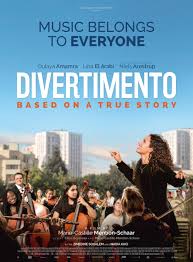
DIVERTIMENTO
France, 2023, 110 minutes, Colour.
Oulaya Amamra, Lina El Arabi, Niels Arestrup, Zinedine Soualem, Nadia Kaci, Laurent Cirade, Martin Chapoutot.
Directed by Marie-Castille Mention-Schaar.
A film for music lovers. And, for music lovers who might be intimidated, a great range of music throughout the film but some well-known pieces, Ravel’s Bolero, Prokofiev and Romeo and Juliet, Dvorak’s New World Symphony, Schubert, Mozart…
And music pervades the film. It is based on actual characters and events and, for those not aware of the characters, a recommendation to do some googling after watching the film to discover more about them and their huge musical achievement.
Divertimento opens with Bolero, a family which has migrated from Algeria to the Paris suburbs, watching television and a famous conductor conducting Ravel. Zahia, one of the couple’s twin daughters, her hand moving in the rhythms, some movements of conducting. 1985. Then a transition to 1995, the twins are 17, Zahia, the older by some minutes, studying music, the viola, even conducting a local suburban orchestra. Fettouma, the younger, is a cellist. And the father loves music.
The film focuses on a short period, the two sisters going into Paris to a Conservatorium, but immediately looked down on, mocked by wealthier students (who may not even want to be professional pianists just pleasing their parents), racial insults, poverty insults, suburban insults. And, when it quickly emerges that Zahia wants to conduct, ridicule about female conductors, so few in the world, so poor in their profession…
Zahia is strong-minded, strong-willed, to say the least. Not only does she persevere, standing up to the star conductor student but eventually falling victim to preference for male conductors, she asks a question of a celebrated conductor, Sergiu Celibidache (veteran Niels Arestrup) who makes comments about female conductors not persevering but shows great interest in Zahia, inviting her to his ensemble, critical, humiliating, yet encouraging, explaining…
Part of the drama of Zahia’s enthusiasm is her wanting to have her own orchestra. She is only 17 and receives a great deal of criticism. But, she perseveres, practising conducting Prokofiev with a piano student, then persuading some of the Paris students to come out to her suburb and be part of the orchestra, preparing for a competition, playing Saint-Saens’ Baccarole. But, she is depressed when her sister is not awarded a gold medal at her exam (though there is a pleasing sequence when her critic presents her with a marvellous cello) and she herself is defeated by the male student in the conducting exam.
The sisters call their orchestra Divertimento – and it is a commitment to their suburban community, especially with children, and a Down Syndrome girl learning to cello strings I use of colours on each string, and colours on the music sheet.
Some emotional scenes, a clash with her father, support from her sister, a challenge from the veteran conductor, his urging her to not isolate herself but to be one with the orchestra. The ending might seem over happy – and it certainly is happy, conducting, the orchestra in the Street, suburban onlookers, and a vigorous rendition of Bolero.
Which is not a fanciful ending at all when one knows about the success of the two sisters, their orchestra, divertimento - and, once again, the recommendation to do some googling to find out what they have achieved.
- The title? Two sisters, their orchestra, the film and the establishing of the orchestra, the aftermath, the great success, music, charity support?
- A true story, the two sisters and their family, Algerian background, in Paris, the suburbs? Local music education, orchestra? Paris and the Conservatorium? The world of music education?
- The musical score, opening and closing with Bolero, the New World Symphony, Bacarolle of Saint-Saens, Prokofiev, Schubert, the range of the musical score? The music lovers? For those not so familiar with classical music?
- 1985, the family, television, Bolero, the conductor, Zahia and her hand movements?
- 1995, the suburbs, the family, the father and his love for music, the encouragement of the mother, Fettouma and the cello, Zahia conducting, the viola, fellow students, the social work and supporting the families, the children, the Down syndrome girl and the colours for the strings and the musical score?
- The transition to Paris, students, wealthy, arrogant, this sneering at the girls, the response of the class? The lead conductor and his skills, rivalry with Zahia, have you been given opportunity, conducting, the mockery?
- The visit of the conductor, his reputation, age and experience, his commentary, criticising the conductor who is not friendly with the orchestra, Zahia her question, his interest, his comments about women conductors, few and not persevering? Her going to the orchestra, his interest in her, the criticisms, humiliating, challenging, in private? His continued challenge and support?
- The exams, the critical supervisor of Fettouma, her skill, not getting the gold medal? Zahia, her practice with the Prokofiev, the pianos, conducting, the exam, her losing out to the young man?
- Her disappointment, reaction to her father, sulking? The challenge from the conductor?
- Forming the orchestra locally, going to Paris, the students getting the train, the challenge of going out into the suburbs, eyes opening, performance, practice?
- Zahia giving up, the challenge to move on, the orchestra in the street, all the students, the neighbours watching, Bolero, her coming out, conducting, achievement?
- In the aftermath of the sisters and their career?